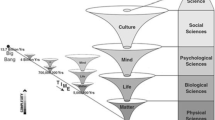Abstract
Although behaviorism constitutes a veritable revolution in psychology, as the renunciation of animism in favor of a concern with directly observable events, it continually faces misunderstandings, both within and without the movement. Within the movement, it is confused with the technique of conditioning in various forms, while nonbehaviorists misinterpret the disapproval of animistic interpretations as a rejection of such important forms of behavior as perceiving, thinking, feeling, and so on. It is proposed that the interbehavioral version of antianimism shows the way toward a valid, comprehensive, system of scientific psychology.
Similar content being viewed by others
References
KANTOR, J. R. 1924–1926. Principles of Psychology. New York: Knopf.
KOSHTOYANTS, K. S. (Ed.). 1955. J. P. Pavlov, selected works. Moscow: Foreign Languages Publishing House.
Author information
Authors and Affiliations
Additional information
Invited address delivered at the May 1976 meeting of Midwestern Association of Behavior Analysis, Chicago.
Rights and permissions
About this article
Cite this article
Kantor, J.R. Behaviorism, Behavior Analysis, and the Career of Psychology. Psychol Rec 26, 305–312 (1976). https://doi.org/10.1007/BF03394392
Published:
Issue Date:
DOI: https://doi.org/10.1007/BF03394392



